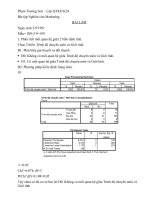Bài tập cá nhân marketing management
Bạn đang xem bản rút gọn của tài liệu. Xem và tải ngay bản đầy đủ của tài liệu tại đây (116.26 KB, 11 trang )
: MARKETING MANAGEMENT
Questions:
1. Explain the following:
(a) Production concept
(b) Product line
(c) Augmented product
(d) Social marketing concept.
2. Explain various concepts of marketing with suitable examples.
3. Explain market segmentation with suitable examples.
4. Explain process of selecting the final price.
5. Explain “direct marketing" and its applicability with examples.
CONTENT
I/- INTRODUCTION:
Nowadays, marketing plays a very important role in the survival and development
of most businesses. In this assignment, we will consider some parts of the marketing
system as follows:
1- Explain the following: (a) Production concept; (b) Product line; (c) Augmented
product; (d) Social marketing concept.
2-Explain various concepts of marketing with suitable examples.
3-Explain market segmentation with suitable examples.
4-Explain process of selecting the final price.
5-Explain “direct marketing" and its applicability with examples.
II/- BODY:
1/- Explanations are as follows:
(a) Production concept:
Production concept holds that consumers will favor products that are available for
use and widely distributed at low costs. Thus, marketing management should focus on
the promotion of product production and distribution. The concept above is explained
by two main reasons as follows: Firstly, when demand for a product exceeds the supply,
as usual in developing countries, buyers would rather pay much attention to getting
products to consume than focus on the subtle attributes of its quality. Therefore,
manufacturers will focus on increasing the scale of production with the desire to
increase sales and profits. Secondly, when the product price is high and needs reducing,
businesses will seek to increase the production to achieve economic efficiency
according to the scale and thereby, they can expand the market.
For example, Henry Ford is one of the pioneers in the production marketing concept.
Since 1900s, he has focused to make all efforts on perfecting the mass production of
automobiles in order to lower costs so that more Americans can afford them. This
orientation is also a key strategy of many Japanese companies.
However, this concept will be very difficult to be implemented if there are
encountering situations that demand is greater than supply capabilities; and low prices as
well as the ease of shopping (due to widely distributed) are no longer the major factors
that consumers should consider when making decisions on buying.
(b) Product line:
Product line is a series of products similar in the structure, function, shape, and
characteristics for everyone to identify.
For example, automobiles have a lot of categories for customers to be aware of; thus,
the manufacturer of each company produces its own certain product line such as Toyota
Camry, Toyota Corolla, Toyota Innova and so on.
(c) Augmented product:
Effective marketing not only requires businesses to develop good products, fix a
price attractively and provide that product to target customers but also thinks about
bringing intangible benefits to customers, which is the supply of services before, during
and after the sale, such as warrantyand free maintenance, which makes customers peace
of mind and confident in their brand, product quality.
For example, when buying a car, customers expect to get warranty, maintenance from
genuine manufacturers. Or when buying Iphone 5S, in addition to normal functions such
as call answering, calling, messaging, network accessing, we think it should have other
functions as listening to music, filming, taking photos and the image of Iphone shows
level of its user, so customers are willing to buy 01 IPhone 5S with high price.
(d) Social marketing concept:
This is a new concept conceived in the 1970s and has gained a lot of attention,
interest of social classes. Social marketing concept holds that the tasks of businesses are
to determine the needs, desires and interests of target markets and to distribute expected
satisfactions more effectively than other competitors through trying to preserve or
enhance welfare of consumers and the society. Previously, businesses put their marketing
decisions based on calculations of immediate profits. Then, they started to realize the
long-term importance of satisfying desires of customers and that led to marketing
concepts. Nowadays, they start to put social benefits factor into their decision-making.
The social marketing concept arises from the suspicion if the pure marketing concept can
establish an adequate business concept or not in times with environmental pollution,
resource depletion, overpopulation and lack of social service work. In the realization,
serving and satisfying the needs, whether businesses have always relied on the good
long-term interests of consumers and the society or not ? The pure marketing concept can
obmit conflicts between the immediate desires and long-term happiness of consumers.
The social marketing concept requires marketers to balance three objectives when design
marketing policies: to satisfy customers, to contribute to the profits achievement of the
corporate and to ensure social welfares. Thanks to this, marketing activities will be
significantly better with the longer-term benefits.
The choice of a particular marketing concept in marketing management practice
depends on a lot of factors: the competitive position of the business, features of products
and services, needs of the target market, abilities of the marketing team of business, etc.
The importance is that the implementation of this marketing concept must bring the
highest satisfaction to the customers, contribute to the achievement of objectives of the
businesses and not damage interests of the society.
2/- Explain various concepts of marketing with suitable examples:
- Marketing is a good product sold in convenient places to right person with a
reasonable price. (Adcoketal).
For example, an enterprise specialized in producing premium footwear products
takes their products to rural and remote areas for sale. The methods of business and
sales of this enterprise prove that they have not understood marketing, i.e. they have
not done market research, not sold what customers need and just sold what they have.
- Marketing is activities aiming towards customers to satisfy their needs and desires
through the interactive exchange process. (Kotler 1980).
For example, businesses are always seeking for all solutions to innovate their
products in order to bring more and more benefits to their customers, which means
they are implementing their marketing activities.
For example, power Companies facilitate transaction offices in every district to
communicate and quickly resolve customers' requests, which makes customers more
confident in the power sector than before. Or customers can pay electricity bills via card
and in banks to reduce costs and moving time. That is Marketing.
-Marketing is a task in the organizational structure and a set of processes in order
to create, exchange, transfer values to customers, and to manage customer relationship
in different ways to bring benefits to the organization and members of the Assembly of
Shareholders. (American Marketing Association 2008)
For example, TOYOTA is always pioneering in the release of new product lines,
namely lines of TOYOTA 86, TOYOTA has improved designs, modern technologies,
reasonable price, fuel economy; currently, TOYOTA products appear everywhere; when
mentioning 4-to-16-room cars, Vietnamese drivers immediately think of TOYOTA, which
proves that TOYOTA has good marketing operation.
3/- Explain market segmentation with suitable examples.
Market segmentation also known as target marketing is a concept contrary to mass
marketing and diversified products marketing. The objectives of market segmentation in
marketing are to divide the market into smaller segments, to easily recognize, understand
and respond more effectively. Because of limited resources, businesses can not meet all
markets; furthermore, every business has its own strength, which is different from other
competitors, so to effectively meet the needs of the market, businesses need to segment
the market, choose the target market to be able to compete effectively and survive
sustainably to other rivals.
For example, we see most clearly in the automobile market: the highest level is
Maybach, Rolls Royce; the following level is Mercedes, BMW and Audi; the middle
level is Toyota, Honda and Ford; the popular level is Kia Motors; the low and perishable
level is Chinese cars.
4/- Explain process of selecting the final price
When developing a new product and introducing it into a target market, we must
set prices according to the following steps:
Identify target → Identify product needs → Expect fund → Analyze product price
and products of competitors → Choose the method of fixing a price → Determine
the final price
4.1. Identifying target to fix a price:
Price is a tool to achieve objectives of businesses, the price determination for products
starts with identifying targets; each target may require different prices, which must be based on
product strategy selected in each time. Policy of price formation is mainly due to the earlier
decisions to locate on the specified market. It is neccesary for enterprises to make decisions to
reach which targets through specific products; the more clear targets are, the easier the valuation
is. The objectives needed to be identified are existence objective; objective to maximize current
profits; objective to increase sales volume; objective to lead in product quality; objective to lead
in stability; other objectives.
4.2 Identifying needs of the product in the target market
The identification of demand on product in the target market serving the valuation
focuses on two fundamental issues, which are the graph of demand and the elasticity of demand
regarding price; therefore, firstly, it should identify the product demand of businesses in the
target market. It is necessary to determine the change in demand when publishing different
expected prices, then forming the graph of demand. To identify the elasticity of demand to the
product price, we will use two methods as follows:
- The method based on historical experiences of the relationship between price and
demand has been collected in different markets.
- The method to investigate and select samples, conduct interviews with customers in the
target market. Identification of the elasticity of demand to price is the important base for product
valuation. To quantify demand, it needs to conduct the valuation at different levels, this analysis
will help to shape the demand curve. In addition, it is affected by other factors, which are returns,
additional and alternative product prices that will shift the demand curve but will not alter its
shape. To survey and predict the sales volume, we use the following types of survey:
+ To survey customers' attitudes towards price; to estimate sensitivity of market prices
+ To survey the possibility to accept customers for expected prices
+ To determine the elasticity of demand according to price
4.3 Cost estimaion
- Market demand decides the maximum price that businesses can sell their products; on
the other hand, the minimum price is due to expenses of businesses. This step is to determine the
costs of products such as: fixed cost, variable cost and total cost, trying to analyze incurred costs
in the manufacturing process, cost of product distribution activity and cost for marketing and
sales support.
- When determining the cost of production, businesses must analyze the breakeven point.
This is the basis for determining and selecting appropriate prices, for selecting the minimum
prices to each different sales rate to reach the break-even point.
4.4 Analysis of product prices of competitors
When valuating a product, consumers are usually based on prices and quality of other
equivalent products. Therefore, businesses need to know the prices of competitors by appointing
the staff to survey prices, to compare prices and product characteristics; it can search lists of
prices of competitors, interview buyers of products of competitors. Businesses can be based on
prices and products of competitors as a starting point for their product prices.
If products of businesses are similar to competitive products, it must be fixed closely to
the price of competitive products. For higher valuation, businesses must ensure their higher
product quality. In essence, businesses use prices to position their products as compared with the
prices of competitors.
4.5 Selection of valuation methods
When knowing the demand curve, total estimated cost and prices of competitors,
businesses can choose the product price; when choosing the product prices, businesses must rely
on the demand curve, costs, and prices of competitors;
Selection of valuation methods is based on three rates as follows:
* Too-low price: This price cannot be profitable
* Possible price: + Cost of products
+ Prices of competitors
+ Distinctive qualities of the product.
* Too-high price: This price cannot form the demand
Thereby, the minimum price may be decided by the cost, the maximum price may be
decided by the particular products of the business. Product prices of competitors and alternative
products offer a medium price, which businesses also need to rely on for the valuation.
4.6 Determination of the final price :
After implementing the steps above, the price distance has been narrowed down; to
choose the final and suitable price for the product, we need to consider some bases as follows:
- Psychology to accept the price of customers;
- Price policy of the enterprise;
- Price influence(s) to distributors, sellers and State policy.
- Price influence(s) on the products on business, then inform the selected price to parts for
performance
5/- Explain “direct marketing" and its applicability with examples
-According to the Direct Marketing Association, direct marketing is a marketing
communication system having frequent operation with the interaction of a number of
media to create positive reactions of exchange or transaction (measurable) from
customers that are less limited by space and time. The most basic difference between
direct marketing and traditional marketing methods is the interaction and exchange of
information between buyers and sellers, between communication subject and object - the
receiving object. Thereby, businesses can easily evaluate the effectiveness of their
communications. Direct Marketing is expressed through many specific communication
activities directly aiming to customers such as direct mail to introduce products and
businesses, order mail enclosed list of products can be ordered for customers to choose.
Objectives that every marketing program directly aims to are direct and positive response
of customers of this program.
Direct Marketing brings many benefits for both customers and businesses. For
customers, it help save shopping time, know many new items to choose, it is quite
consistent with new lifestyle, overcomes obstacles of space, avoids participating in traffic
in unsafe inconvenient conditions but still able to choose the most satisfactory products.
For businesses, Direct Marketing helps search for real orders for each item, get more
information about customers as quickly as possible, properly aim to targets with high
communication efficiency and low cost. Besides, it can ensure the privacy and the ability
to "hide" strategies against other competitors (with the traditional forms of marketing,
competitors will have easy access to media programs of businesses, meanwhile, with
direct marketing, the competitors seems to be "taken in" because only target objects
receive information). The greatest advantage of direct marketing is the ability to measure
responses of target customers, thereby helping businesses evaluate the effectiveness of
each direct marketing program. They can make sure which program is successful, which
program fails, thereby, having appropriate policies applied to each group of customers
and product categories as well as each market area. Finally , direct marketing helps
effectively use resources most, especially, it is suitable for enterprises facing situation to
mitigate the structure, small and medium enterprises or enterprises aiming to discrete
market segments with specific demands.
However, direct marketing also has some disadvantages such as requiring the
initial investment for the construction of databases, physical conditions; requiring trained
human resources with professional qualifications. A further problem is that not in any
condition, direct marketing will be welcomed by customers. In the case that in the
market, including most customers with daily buying behavior at the market and just
believing in their experience after consuming products, direct marketing also cannot
promote its effectiveness in the early stage, it needs a period of time for customers to
adapt, get acquainted.
Examples of applications of direct marketing:
Gardeners published Catalog of gardeners along with information on gardening to
give customers with gardening needs. Similarly, during two centuries, XVIII and XIX,
many mail-order catalogs were published. Since the 60s of last century, direct marketing
has grown rapidly and become a key marketing tool in many industrialized countries. It
has been predicted that in future, direct marketing will replace other forms of traditional
communication marketing and become one of the main marketing tool because it is the
integration of all 3 forms: advertising, sales promotion and direct sales to make sales
without intermediaries.
Power Company of Ben Tre (Ben Tre PC) has taken forms of direct marketing as
follows:
- In December every year, PC Ben Tre directly sends letters for comments,
assessments about the Company by mail to more than 35,000 customers and receives
feedbacks equal to 20% of the total number of mails sent.
- In January every year, PC Ben Tre sends email to 105,000 customers and
receives feedbacks equal to 10% of the total number of mails sent.
-In February every year, PC Ben Tre propagandize to save power directly on the
media communications such as radio, television, through living activities in urban groups,
schools, agencies and social organizations civil. As a result, in 2013, they saved
16.000.000Kwh, accounting for 2.26% of commercial electricity. Furthermore, they
organized customer conference(s), which also received many valuable comments that
helped PC Ben Tre serve their duties better.
III/- CONCLUSION:
Through explanations and examples of some components of marketing as above, we
can see that marketing is very important for the survival of businesses, so businesses
must take great care and pay attention to the development and deployment of marketing
plans and strategies in order to ensure the sustainable survival and development in the
fierce competitive environment as today.
References:
1. (accessed 16 May 2014)
2. (accessed 18 May 2014)
3. (accessed 22 May 2014)
4. (accessed 22 May
2014)
5. PHAM THI HUYEN. SOURCE: SCIENTIFIC ACTIVITIES MAGAZINE NO. 588, MAY – 2008
6. 2013 Final Report of Bentre Power Company.









